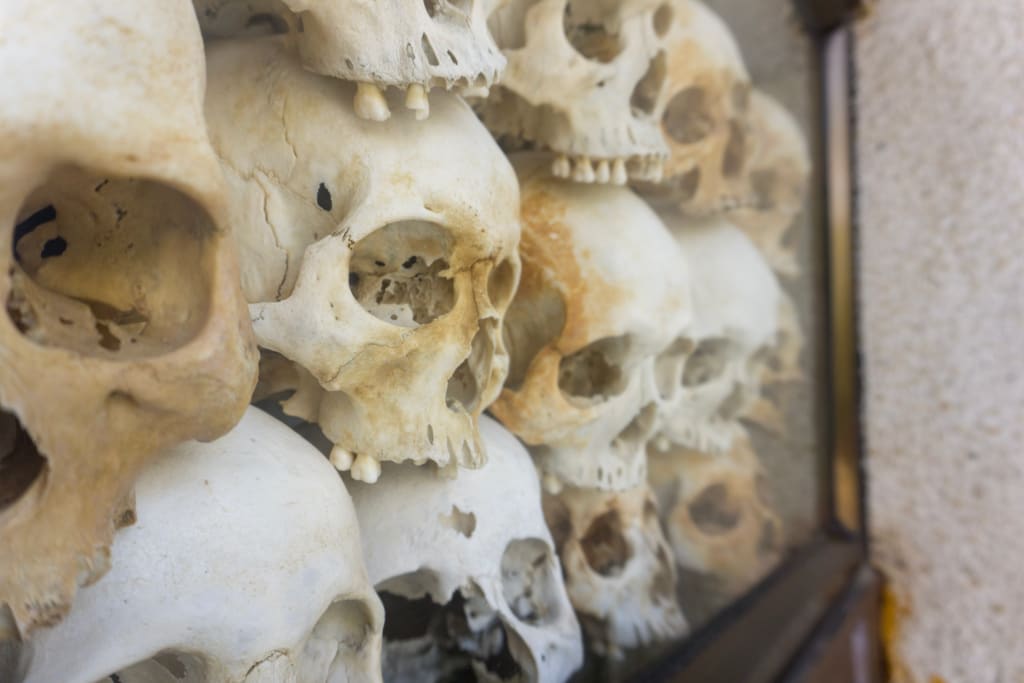Mystery of the Massacre Of 900+ People
A haunting reminder of the intricate vulnerabilities of the human mind

In the heart of Guyana, a chilling chapter in history unfolded as Jim Jones, the enigmatic leader of the Peoples Temple and Church, orchestrated a mass tragedy that shook the world. The haunting events of Jonestown in 1978 saw the demise of over 900 individuals who fell victim to Jones's twisted vision, culminating in a deadly cocktail of cyanide-laced Flavor Aid.
Jim Jones, a charismatic and manipulative figure, founded the Peoples Temple in Indianapolis during the 1950s. Initially a preacher advocating for racial equality and social justice, Jones's leadership took a dark turn as he gradually transformed the religious organization into a cult. Moving the congregation to California, he established the infamous Jonestown settlement in Guyana, where the tragedy would eventually unfold.
The Peoples Temple attracted a diverse following, drawing individuals seeking a sense of community, purpose, and utopian ideals. However, beneath the façade of communal harmony lurked a leader driven by paranoia and an insatiable thirst for control. Jones implemented strict rules, fostering an environment of fear and manipulation that gripped the community in Jonestown.
As the cult's influence expanded, concerns about the Peoples Temple's activities reached the United States government. Investigative reports and testimonies from defectors painted a grim picture of abuse, coercion, and brainwashing within Jonestown. The mounting pressure prompted Congressman Leo Ryan to embark on a fact-finding mission to Jonestown in November 1978, accompanied by a delegation that included concerned family members of Peoples Temple followers.
Initially cooperative, the facade of normalcy quickly crumbled as Ryan and his delegation witnessed the oppressive conditions within Jonestown. Faced with growing scrutiny and a sense of impending doom, Jim Jones made the fateful decision to seal the fate of his followers.
On November 18, 1978, as Congressman Ryan and his delegation prepared to leave Jonestown with a group of defectors, tragedy struck. Members of the Peoples Temple ambushed the delegation at the Port Kaituma airstrip, resulting in the deaths of Ryan and four others. This event marked the prelude to one of the most horrific mass suicides in history.
Back in Jonestown, Jones, realizing that the walls were closing in, orchestrated a macabre ritual that would forever stain the pages of history. In an orchestrated act of mass suicide, over 900 individuals consumed a lethal concoction of cyanide and Flavor Aid. The eerie scene unfolded as children, women, and men succumbed to the poison, a horrifying end to a misguided allegiance to a charismatic yet deranged leader.
The aftermath of the Jonestown tragedy prompted widespread shock and disbelief globally. The horrifying images of rows of lifeless bodies shocked the collective conscience of humanity, forcing society to grapple with the dangers of unchecked charismatic leadership and the vulnerability of individuals seeking belonging and purpose.
The legacy of Jonestown serves as a stark reminder of the potential consequences when blind faith collides with the unchecked power of a charismatic leader. The tragedy prompted a reevaluation of religious and communal movements, leading to increased scrutiny and regulatory measures to prevent the recurrence of such dark chapters in human history.
In the annals of cult history, Jonestown stands as a chilling testament to the fragility of the human mind, the dangers of unchecked authority, and the devastating consequences when the quest for community and purpose takes a dark and deadly turn.
The Jonestown tragedy serves as a haunting reminder of the intricate vulnerabilities of the human mind, the perils associated with unchecked authority, and the devastating consequences when the pursuit of community and purpose takes a sinister turn.
Fragility of the Human Mind:
The human mind is a complex and malleable entity susceptible to influence, especially in the quest for belonging and purpose. Jim Jones preyed on the innate human need for connection, community, and purpose, drawing individuals into the Peoples Temple with promises of a utopian society. The fragility of the human mind is evident in the way Jones manipulated his followers, instilling fear, paranoia, and blind allegiance. This manipulation stripped individuals of their critical thinking abilities, making them vulnerable to the leader's increasingly erratic and dangerous directives.
Dangers of Unchecked Authority:
Jim Jones's unchecked authority within the Peoples Temple exemplifies the dangers inherent in concentrated power. As the leader of the cult, Jones wielded absolute control over every aspect of his followers' lives, creating a cult of personality where dissent was suppressed, and independent thought was punished. The unchecked authority granted to Jones allowed him to perpetrate abuses, exploit his followers, and ultimately orchestrate the mass tragedy in Jonestown. This tragedy serves as a stark warning about the potential for abuse when authority is not held accountable and when followers are stripped of their agency.
Devastating Consequences of Misguided Quest for Community and Purpose:
The Peoples Temple initially attracted individuals seeking a sense of community, purpose, and utopian ideals. However, the quest for a better life took a dark turn as Jim Jones exploited the genuine desires of his followers. The tragedy of Jonestown underscores the profound and devastating consequences when the pursuit of community and purpose becomes entangled with the toxic influence of a charismatic but delusional leader. What began as a search for meaning ended in a horrific mass suicide, demonstrating the dangers of blindly following leaders who promise salvation but lead their followers down a path of destruction.
The lessons from Jonestown reverberate through history, prompting societies to critically examine the dynamics of power, authority, and the delicate nature of the human psyche. It underscores the importance of fostering critical thinking, promoting accountability in leadership, and being vigilant against the potential dangers of charismatic figures who exploit the genuine human quest for community and purpose. The tragedy of Jonestown stands as a solemn reminder of the need for a vigilant and informed society to prevent such dark chapters from repeating in the future.
Image captured by Joseph Anson, available on Unsplash. Photo link: Joseph Anson on Unsplash
About the Creator
Pearl Phillimon
My name is Pearl K. Phillimon and I am a writer, a lover, and a passion fruit. I live full-time chasing the seasons and writing from the road. I am a soul that cannot be defined by just one thing. Dive into my undefined existence.





Comments
There are no comments for this story
Be the first to respond and start the conversation.